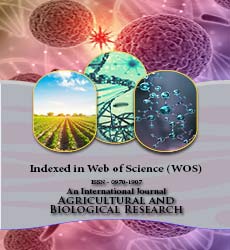Agricultural and Biological Research
RNI # 24/103/2012-R1
Rashid Ismael Hag Ibrahim*, Hala Ragab Nosiar and Osman Ali Hag El Amin
The potential protective effect of peppermint (Mentha piperita; Labiatae) water extract was investigated on onion (Allium cepa) root tips that were exposed to cytotoxic and genotoxic insecticides; cypermethrin or malathion. Cypermethrin was tested at 0.019, 0.038 and 0.075 mg/ml and malathion at 0.235, 0.469 and 0.938 mg/ml, based on concentrations used in the field. Parallel doses of 4 µg/ml or 8 µg/ml peppermint extract were applied for each insecticide treatment, while distilled water was used as a control. Exposure time was 8 hours for all treatments. Mitotic Index (MI), Cell Proliferation Kinetics (CPK), percentage of Mitotic Aberrations (MAs) and Nuclear Aberrations (NAs) were evaluated. Both insecticides exerted a significant decline in MI (p<0.001) and mitotic kinetics aberrations, which indicated potent cytotoxicity of both insecticides even at lower doses, where significant reduction of MI (more than 50% below the control) because of prophase imbalance and metaphase arrest. Both insecticides induced a concentration dependent MAs ranged between 19.0 and 29.6%. MAs and TAs of cypermethrin were significant at the high dose, while those caused by malathion were significant at both medium and high doses. Aberrations observed included; bridges, vagrants, laggards, stickiness, multipolar, binucleated cells, micronuclei, lobed, blebbed and vacuolated nuclei. Application of peppermint water extract to both insecticides reduced the cytotoxic and genotoxic capacity of these insecticides.
